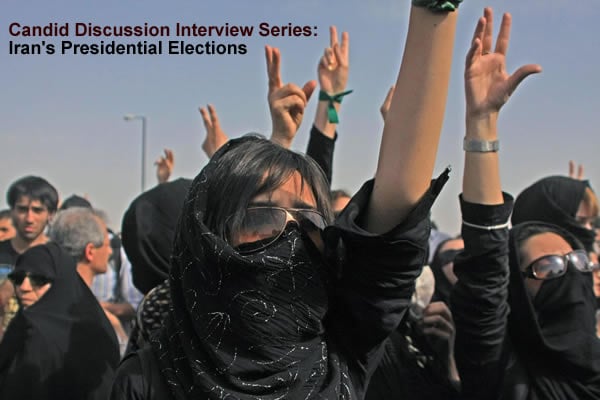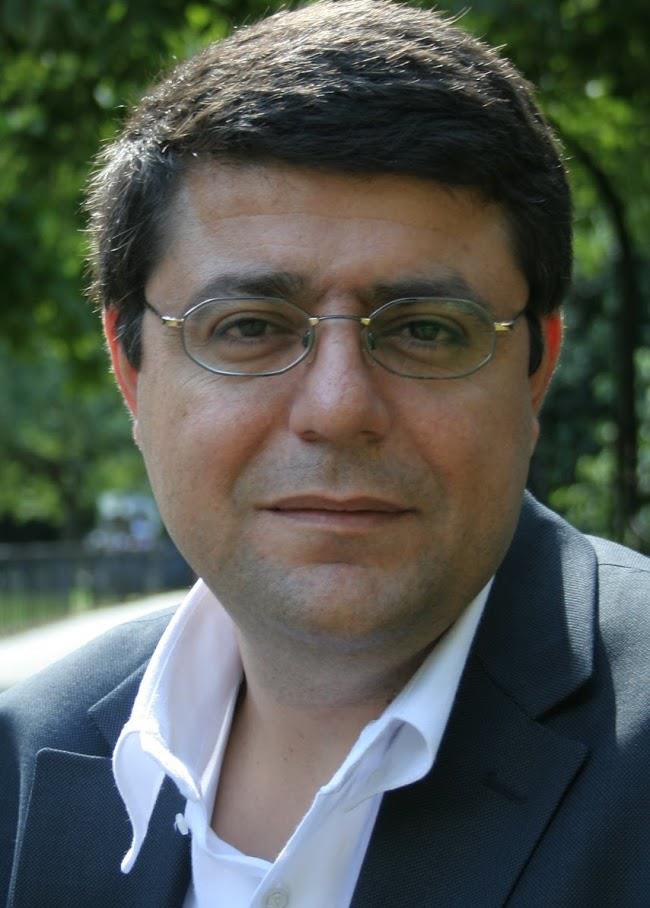
Jamshid Barzegar on the Authenticity of Iranian Elections

Jamshid Barzegar is a Senior Iran Analyst and Editor at the BBC Persian Service. He was previously head of BBC Persian Radio and Online Service as well as Editor-in-Chief of Radio Free Europe/Radio Liberty’s Persian service known as Radio Farda. Mr. Barzegar is currently pursuing a PhD degree at the University of Vienna in Political Science and Government. He sat down with Reza Akhlaghi of Foreign Policy Association to discuss Iran’s June 14 presidential elections.
_________________________________________________________________
Put in context the disqualification of Hashemi Rafsanjani and Rahim Mashaei and the impact of their disqualification on election and post-election dynamics.
The disqualification of Akbar Hashemi Rafsanjani and Esfandiar Rahim Mashaei is not only a sign of a new phase in the Islamic Republic, but also a necessary step towards it for the Supreme Leader, Ali Khamenei, and those hardliners who rule the country. In fact, the upcoming elections can be seen both as a final stage for the removal from power of the first generation of the founders of the Islamic Republic; those who have been viewed by Ayatollah Khamenei as a barrier to his policies and a starting point for a new generation of power elite.
Since the main core of power elite, despite their internal conflict on choosing their favorite candidate, they concurred on expurgating undesired figures such as Mohammad Khatami, Akbar Hashemi Rafsanjani and Esfandiar Rahim Mashaei. Then they tried all means to either prevent their candidacy or disqualify them weeks ahead of the elections in order to be able to manage any potential protest.
This has given Ayatollah Khamenei the ideal situation he was looking for: a calm election without a strong, charismatic candidate. Ayatollah Khamenei had warned the elections should not be a challenge to the security and, in order to reduce any potential risk, he did not take the risk to allow some candidates to pass the Guardian Council’s filter, fearing they could challenge the election’s process and results. In fact, he experimented this two years ago during the parliamentary elections. What we’re seeing now is well-controlled and planned set of steps towards an election with pre-determined results that includes both participation figures and candidate votes.
So in short term, the Supreme Leader and hardliners are victorious. But the life is not that short and the battle is not finished yet. Disqualification of Rafsanjani will have its mid-term and long-term impact on the system. As much as Ayatollah Khamenei unifies and refines his side, he increases his exposure to criticism and the rapidly growing opponents who are finding more common ground for discourse and collaboration.
With the crisis of state ideology in the current power structure, how do you think the Supreme Leader would contain it?
Currently, it is hard to find someone who thinks the whole regime and Ayatollah Khamenei are not the same. Both his opponents and very loyal fellows admit that he, as he wished for years, is the only person that matters. Instead, it is easy to see and hear that many believe after three decades of an anti-monarchic and anti- autocratic revolution, autocracy is back and monarchy has been re-instated.
Nevertheless, the Supreme Leader faces many challenges. Some of the old revolutionary forces are currently out of favor and power due to their differences and resistance against Ayatollah Khamenei and his new allies who mainly belong to the second generation of Revolutionary Guard Corps and security forces. On the other hand, the Iranian society is brewing with discontent and disenchantment, a factor that would eventually act against the Supreme Leader.
In this context, the upcoming election with its current candidates would not be a turning point or bring any significant changes to the system’s policy, approach and function. But this election will prove to the majority that the main conflict is once again between autocracy and democracy rather than a struggle within the Islamic Republic between reformists and conservatives trying to keep the system intact. This would shape the battlefield. Consistent efforts within the system to monopolize power and the economic pie among the loyal forces would give more impetus to those who try to make radical changes.
As I said, sacking or dismissal of those who are strong or could be strong on the stage is a necessity for the main core of the power structure with the Supreme Leader at its center at this point. This does apply not only to, for example, the Green Movement’s leaders or Mr. Khatami and main reformist figures, but also does apply to a verity range from Mr. Rafsanjani to Mahmoud Ahmadinejad and even high ranking clerics such as Mohammad Taghi Mesbah Yazdi. Renunciation of Kamran Bagheri Lankarani after such strong support from Ayatollah Mesbah has revealed the fact that no matter who, everyone must know his seat and observe the rules and limitations.
Naturally, it is easier to work with either someone from the inner circle or someone without enough power and strong root in the system or society. Giving administration and executive role to this sort of candidate in short term would benefit the main core of the power structure because that would enable them not only to have ultimate control, but also make all necessary changes when and if needed. In other word, the system has already started to replace the president with a prime minister, who will be appointed and not selected by people’s direct vote, as Ayatollah Khamenei had suggested once.
With the Iranian government’s increasing concern for social and political stability in the run up to the elections, do you see potential for the emergence of a post-election socio-political dynamics?
For two reasons it is unlikely to foresee any noticeable emergence right after or just for during the elections because of extensive repression after the 2009 elections did not leave any charismatic leader inside the country who could act and lead effectively. Also, the approved candidates would not challenge the process and result of the elections. Many supporters of the Green Movement are either disappointed or disorganized or have rather different demands and goals, which are beyond the socio-political boundaries of the Islamic Republic. This means it would be very difficult to mobilize them behind a formidable candidate who has the will or vigor to shake things up.
This election, internally within the system and externally out of the power structure, would feed socio-political dynamics. As the government becomes more and more unambiguous and repressive, critics and opponents find more integrated demands with a louder and clearer voice. Although the civic society has noticeably suffered over the past decade, easier and faster communication between Iranian communities and activists inside and outside the country as well as international pressure could all play a significant role.
Social and economic conditions are very tough and it is really hard for any new president not to pay attention to them and try to keep the situation as it is. Unemployment, inflation, shortage of basic goods and possible tougher sanctions have left fewer options for the government to meet the daily needs of the public. In these circumstances, the potential for repression could increase in short term. However, recent regional upheavals could have their impact too.
In an Op-Ed piece here at the Foreign Policy Association, you remarked that in Iran there are what the Islamic Iran Participation Front calls “fake reformists.” Can you elaborate on what a “fake reformist” is and how fake reformists differ from what you regard to be real ones?
Many things have changed for reformists such as Islamic Iran Participation Front after their statement a few months ago. At the time, they meant Mohammad Khatami and his close allies are the real reformists; not a few small groups and unknown figures such as Mostafa Kavakebian who were talking about participation in the election; also figures like Mohammad Reza Aref, former VP under the Khatami administration, are “fake reformists.” When Khatami rejected candidacy, they supported Akbar Hashemi Rafsanjani, and now after his disqualification, they are trying to support either Hassan Rohani or Mr. Aref.
Reformists, who consider themselves real, have their own dilemma. Under increased pressure from the system, they tried to redefine themselves and make some clear line between them and radical parts of the Green Movement. This policy not only did not assure the hardliners but also weakened reformists’ base among their supporters.
So the real challenge for key reformist parties such as Islamic Iran Participation Front is not what they called once “fake” because neither people nor the system recognize them as reformist. This term could just be used months before election when reformists were hoping for a comeback with Mohammad Khatami or someone with equal weight.
It seems reformists now need to review previous definitions and approaches to adapt themselves to new conditions. Going through this will give them a chance to rebuild trust among their supporters.
Both ideologically and as a source of socio-political stability, Iran’s brain drain seems to have benefitted the Iranian leadership and power elite, at least in short- to medium-term. Do you think in the next Iranian administration this will emerge as a significant issue in social policy?
Many people believe that the Islamic Republic has implemented in practice what Mohammad Reza Shah once said. After launching the Rastakhiz party (Resurrection Party) as a single political party for all Iranians in 1975, Shah said:
“We must straighten out Iranians’ ranks. To do so, we divide them into two categories: those who believe in Monarchy, the constitution, and the Six Bahman Revolution and those who don’t …anybody who does not belong in the new political party and does not believe in its three cardinal principles, will have only two choices. He is either an individual who belongs to an illegal organization, or is related to the outlawed Tudeh Party, or in other words a traitor. these individuals belong to an Iranian prison, or if he desires he can leave the country tomorrow, without even paying exit fees; he can go anywhere he wishes, because he is not Iranian, he has no nation, and his activities are illegal and punishable under the law.”
The leaders of the Islamic Republic have always criticized the shah very strongly for this speech, but in reality they prepared the ground for young educated citizens who were looking for a job and a better life to leave Iran. Furthermore, the government forced many others such as socio-political activists and journalists to leave the country and live in exile.
No sign can be seen that the Islamic Republic has changed this policy. To them, both political activists and young educated people can be more harmful than useful for the government as their demands cannot be met by a corrupt and repressive regime.
While brain drain has been a continuous phenomenon over the last three decades, after the 1979 revolution we have faced at least five big waves of voluntary and compulsory migration: 1) right around the revolution until 1981; 2) during Iraq- Iran war; 3) after first term of Khatami’s presidency; 4) after 2005 presidential elections; 5) after 2009 presidential elections and repression of Green Movement.
That is enough to show how especially young and educated citizens feel about the current conditions and the country’s future. With every major political event, more people decided (or were forced) to leave Iran. So it is quite unlikely that the upcoming elections could change this trend. When the Green Movement’s leaders are still in jail and even some key revolutionary figures such as Mr. Rafsanjani are not allowed to compete, when the social and economic situation is tougher than any other time and when the government clings to its repressive social and cultural policies more than ever, it would be unrealistic to think of a decrease in voluntary or compulsory migration rates after the June 14 elections.